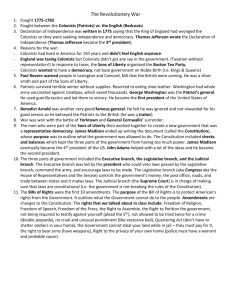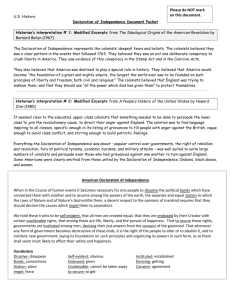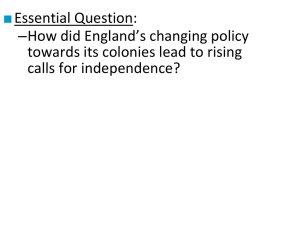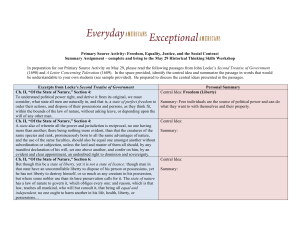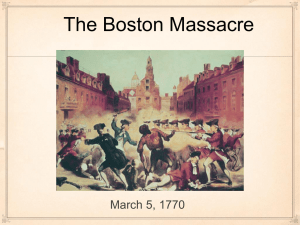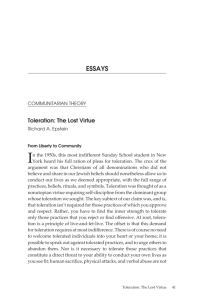Samuel Adams
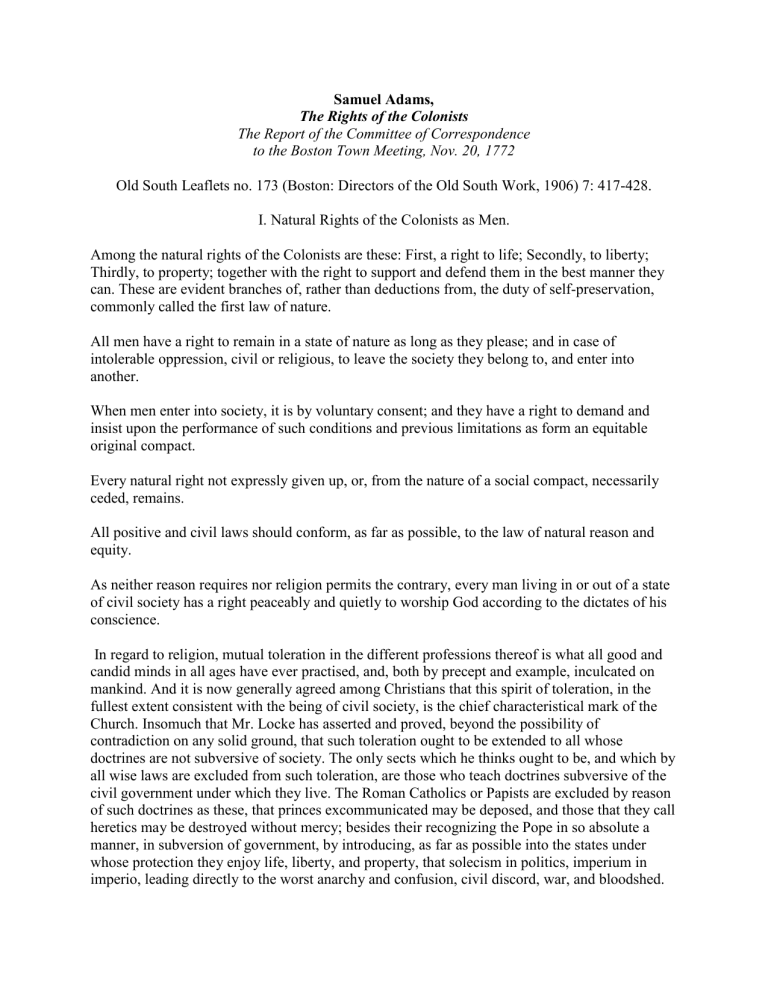
Samuel Adams,
The Rights of the Colonists
The Report of the Committee of Correspondence to the Boston Town Meeting, Nov. 20, 1772
Old South Leaflets no. 173 (Boston: Directors of the Old South Work, 1906) 7: 417-428.
I. Natural Rights of the Colonists as Men.
Among the natural rights of the Colonists are these: First, a right to life; Secondly, to liberty;
Thirdly, to property; together with the right to support and defend them in the best manner they can. These are evident branches of, rather than deductions from, the duty of self-preservation, commonly called the first law of nature.
All men have a right to remain in a state of nature as long as they please; and in case of intolerable oppression, civil or religious, to leave the society they belong to, and enter into another.
When men enter into society, it is by voluntary consent; and they have a right to demand and insist upon the performance of such conditions and previous limitations as form an equitable original compact.
Every natural right not expressly given up, or, from the nature of a social compact, necessarily ceded, remains.
All positive and civil laws should conform, as far as possible, to the law of natural reason and equity.
As neither reason requires nor religion permits the contrary, every man living in or out of a state of civil society has a right peaceably and quietly to worship God according to the dictates of his conscience.
In regard to religion, mutual toleration in the different professions thereof is what all good and candid minds in all ages have ever practised, and, both by precept and example, inculcated on mankind. And it is now generally agreed among Christians that this spirit of toleration, in the fullest extent consistent with the being of civil society, is the chief characteristical mark of the
Church. Insomuch that Mr. Locke has asserted and proved, beyond the possibility of contradiction on any solid ground, that such toleration ought to be extended to all whose doctrines are not subversive of society. The only sects which he thinks ought to be, and which by all wise laws are excluded from such toleration, are those who teach doctrines subversive of the civil government under which they live. The Roman Catholics or Papists are excluded by reason of such doctrines as these, that princes excommunicated may be deposed, and those that they call heretics may be destroyed without mercy; besides their recognizing the Pope in so absolute a manner, in subversion of government, by introducing, as far as possible into the states under whose protection they enjoy life, liberty, and property, that solecism in politics, imperium in imperio, leading directly to the worst anarchy and confusion, civil discord, war, and bloodshed.
The natural liberty of man, by entering into society, is abridged or restrained, so far only as is necessary for the great end of society, the best good of the whole.
In the state of nature every man is, under God, judge and sole judge of his own rights and of the injuries done him. By entering into society he agrees to an arbiter or indifferent judge between him and his neighbors; but he no more renounces his original right than by taking a cause out of the ordinary course of law, and leaving the decision to referees or indifferent arbitrators.
In the last case, he must pay the referees for time and trouble. He should also be willing to pay his just quota for the support of government, the law, and the constitution; the end of which is to furnish indifferent and impartial judges in all cases that may happen, whether civil, ecclesiastical, marine, or military.
[Page 419] The natural liberty of man is to be free from any superior power on earth, and not to be under the will or legislative authority of man, but only to have the law of nature for his rule.
In the state of nature men may, as the patriarchs did, employ hired servants for the defence of their lives, liberties, and property; and they should pay them reasonable wages. Governors have no right to seek and take what they please; by this, instead of being content with the station assigned them, that of honorable servants of the society, they would soon become absolute masters, despots, and tyrants. Hence, as a private man has a right to say what wages he will give in his private affairs, so has a community to determine what they will give and grant of their substance for the administration of public affairs.
In short, it is the greatest absurdity to suppose it in the power of one, or any number of men, at the entering into society, to renounce their essential natural rights, or the means of preserving those rights; when the grand end of civil government, from the very nature of its institution, is for the support, protection, and defence of those very rights; the principal of which, as is before observed, are Life, Liberty, and Property. If men, through fear, fraud, or mistake, should in terms renounce or give up any essential natural right, the eternal law of reason and the grand end of society would absolutely vacate such renunciation. The right to freedom being the gift of God
Almighty, it is not in the power of man to alienate this gift and voluntarily become a slave.
III. The Rights of the Colonists as Subjects.
A commonwealth or state is a body politic, or civil society of men, united together to promote their mutual safety and prosperity by means of their union.
The absolute rights of Englishmen and all freemen, in or out of civil society, are principally personal security, personal liberty, and private property.
All persons born in the British American Colonies are, by the laws of God and nature and by the common law of England, exclusive of all charters from the Crown, well entitled, and by acts of the British Parliament are declared to be entitled, to all the natural, essential, inherent, and inseparable rights, liberties, and privileges of subjects born in Great Britain or within the realm.
Among those rights are the following, which no man, or body of men, consistently with their
own rights as men and citizens, or members of society, can for themselves give up or take away from others.
[Page 421] First, "The first fundamental, positive law of all commonwealths or states is the establishing the legislative power. As the first fundamental natural law, also, which is to govern even the legislative power itself, is the preservation of the society."
Secondly, The Legislative has no right to absolute, arbitrary power over the lives and fortunes of the people; nor can mortals assume a prerogative not only too high for men, but for angels, and therefore reserved for the exercise of the Deity alone.
"The Legislative cannot justly assume to itself a power to rule by extempore arbitrary decrees; but it is bound to see that justice is dispensed, and that the rights of the subjects be decided by promulgated, standing, and known laws, and authorized independent judges"; that is, independent, as far as possible, of Prince and people. "There should be one rule of justice for rich and poor, for the favorite at court, and the countryman at the plough."
Thirdly, The supreme power cannot justly take from any man any part of his property, without his consent in person or by his representative.
Now what liberty can there be where property is taken away without consent? Can it be said with any color of truth and justice, that this continent of three thousand miles in length, and of a breadth as yet unexplored, in which, however, it is supposed there are five millions of people, has the least voice, vote, or influence in the British Parliament? Have they all together any more weight or power to return a single member to that House of Commons who have not inadvertently, but deliberately, assumed a power to dispose of their lives, liberties, and properties, than to choose an Emperor of China? Had the Colonists a right to return members to the British Parliament, it would only be hurtful; as, from their local situation and circumstances, it is impossible they should ever be truly and properly represented there. The inhabitants of this country, in all probability, in a few years, will be more numerous than those of Great Britain and
Ireland together; yet it is absurdly expected by the promoters of the present measures that these, with their posterity to all generations, should be easy, while their property shall be disposed of by a House of Commons at three thousand miles' distance from them, and who cannot be supposed to have the least care or concern for their real interest; who have not only no natural care for their interest, but must be in effect bribed against it, as every burden they lay on the Colonists is so much saved or gained to themselves. The Colonists have been branded with the odious names of traitors and rebels only for complaining of their grievances. How long such treatment will or ought to be borne, is submitted.
